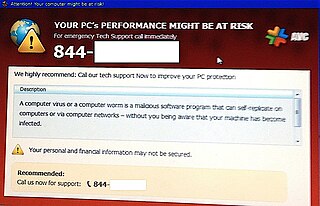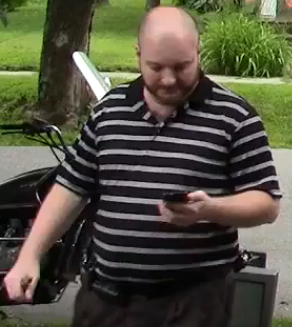A bomb threat or bomb scare is a threat, usually verbal or written, to detonate an explosive or incendiary device to cause property damage, death, injuries, and/or incite fear, whether or not such a device actually exists.

Jussie Smollett is an American actor and singer. He began his career as a child actor in 1991 debuting in The Mighty Ducks (1992). From 2015 to 2019, Smollett portrayed musician Jamal Lyon in the Fox drama series Empire.

Ian David Karslake Watkins is a Welsh former musician. He was the lead singer and frontman of the rock band Lostprophets, which he co-founded with Lee Gaze in 1997. His career ended after he was sentenced to 29 years' imprisonment in 2013 for multiple sex offences, including the sexual assault of young children and infants, a sentence later increased by ten months for having a mobile phone in prison. His bandmates disbanded Lostprophets shortly after his conviction and formed No Devotion with American singer Geoff Rickly.
Knock, knock, ginger is a prank or game dating back to 19th-century England, or possibly the earlier Cornish traditional holiday of Nickanan Night. The game is played by children in many cultures. It involves knocking on the front door of a victim, then running away before the door can be answered.
The strip search phone call scam was a series of incidents, mostly occurring in rural areas of the United States, that extended over a period of at least ten years, starting in 1994. The incidents involved a man calling a restaurant or grocery store, claiming to be a police officer, and then convincing managers to conduct strip searches of employees, and to perform other bizarre and humiliating acts on behalf of "the police". The calls were most often made to fast-food restaurants in small towns.

A computer virus hoax is a message warning the recipients of a non-existent computer virus threat. The message is usually a chain e-mail that tells the recipients to forward it to everyone they know, but it can also be in the form of a pop-up window.

April Fools' Day or All Fools' Day is an annual custom on 1 April consisting of practical jokes and hoaxes. Jokesters often expose their actions by shouting "April Fools!" at the recipient. Mass media can be involved with these pranks, which may be revealed as such the following day. The custom of setting aside a day for playing harmless pranks upon one's neighbour has been relatively common in the world historically.

Eric Alan Neustadter, also known by his Xbox Live Gamertag e, is the former Operations Manager for the Microsoft gaming network Xbox Live. Neustadter is frequently a co-host of Larry Hryb's "Major Nelson Radio" Xbox-related podcast. Neustadter has been with Xbox Live since 2002. He attended the University of Oregon.
A prank call is a telephone call intended by the caller as a practical joke played on the person answering. It is often a type of nuisance call. It can be illegal under certain circumstances.

Pranknet, also known as Prank University, was an anonymous prank calling virtual community that was involved in a string of malicious pranks and instances of telephone harassment, especially during 2009–2011. Their pranks were coordinated through an online chat room, and convinced others to cause damage to hotels and fast food restaurants of more than $60,000. The group was founded by a man who later referred to himself as "Dex1x1", later identified as a Canadian named Tariq Malik. The group has been linked to nearly 60 separate incidents.
Matthew Weigman is a blind American man who has used his heightened hearing ability to help him deceive telephone operators and fake various in-band phone signals. Before his arrest at the age of 18, Weigman had used this ability to become a well known phone phreaker, memorizing phone numbers by tone and performing uncanny imitations of various phone line operators to perform pranks such as swatting on his rivals.

Doxing or doxxing is the act of publicly providing personally identifiable information about an individual or organization, usually via the Internet and without their consent. Historically, the term has been used to refer to both the aggregation of this information from public databases and social media websites, and the publication of previously private information obtained through criminal or otherwise fraudulent means. The aggregation and provision of previously published material is generally legal, though it may be subject to laws concerning stalking and intimidation. Doxing may be carried out for reasons such as online shaming, extortion, and vigilante aid to law enforcement. It also may be associated with hacktivism.
The Sandy Hook Elementary School shooting occurred on December 14, 2012, in Newtown, Connecticut. The perpetrator, Adam Lanza, fatally shot his mother before murdering 20 students and six staff members at Sandy Hook Elementary School, and later committed suicide. A number of fringe figures have promoted conspiracy theories that doubt or dispute what occurred at Sandy Hook. Various conspiracy theorists have claimed, for example, that the massacre was actually orchestrated by the U.S. government as part of an elaborate plot to promote stricter gun control laws.
Exposed.su was a website run by Russian hackers focused on the listing of personal information of celebrities, and other high-profile figures. Among the high-profile victims include Michelle Obama, Donald Trump, Arnold Schwarzenegger, Kim Kardashian, Joe Biden, Hillary Clinton, Beyonce and Robert Mueller. The "doxed" documents, which are hosted on the website, include Social Security numbers, credit histories, loan documents and mortgage information of the individuals.
The live streaming of video games is an activity where people broadcast themselves playing games to a live audience online. The practice became popular in the mid-2010s on the US-based site Twitch, before growing to YouTube, Facebook, China-based sites Huya Live, DouYu, and Bilibili, and other services. By 2014, Twitch streams had more traffic than HBO's online streaming service, HBO Go. Professional streamers often combine high-level play and entertaining commentary, and earn income from sponsors, subscriptions, ad revenue, and donations.

Christopher Charles Cantwell, also known as the Crying Nazi, is an American white supremacist, neo-Nazi, and antisemitic conspiracy theorist.
On December 28, 2017, a fatal swatting incident occurred in Wichita, Kansas, United States. During an online dispute between Casey Viner and Shane Gaskill regarding the video game Call of Duty: WWII, Viner threatened to have Gaskill swatted. Gaskill responded by giving him a false address for his residence, one that was occupied by an uninvolved person, Andrew Finch. Viner then asked Tyler Barriss to make the required fraudulent call to initiate the swatting. Wichita Police responded to the address, and as Finch was exiting his house, police officer Justin Rapp fatally shot him.

Clara Sorrenti, better known as Keffals, is a Canadian Twitch streamer, transgender activist, left-wing political commentator and former candidate of the Communist Party of Canada. She has since ended her affiliation with the Communist Party.
On April 27, 2020, a fatal swatting incident occurred in Sumner County, Tennessee. The incident followed an extortion attempt throughout March and April 2020 in which Shane Sonderman and a group of co-conspirators attempted to obtain the Twitter handle "@Tennessee" belonging to 60-year-old Mark Herring. After an unknown minor in the United Kingdom called local law enforcement to Herring's address, he suffered a fatal heart attack while attempting to leave his home.
Since December 2023, there has been widespread swatting of prominent figures in American politics, as well as bomb scares and other violent threats made against government buildings. The series of swattings extended into January 2024. As of December 2023, the motivations, and whether they are the product of one or multiple individuals, are unknown.










